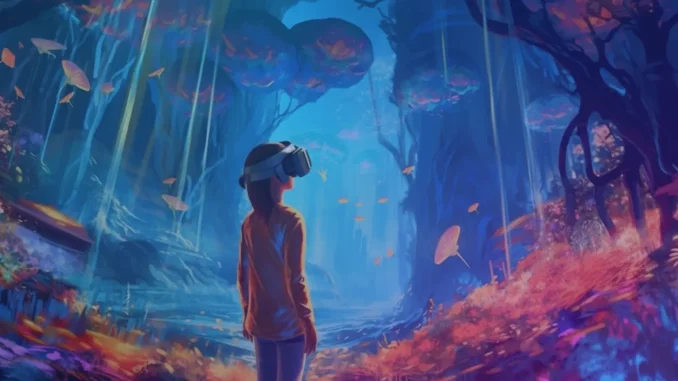
The Metaverse, a concept once confined to science fiction, is rapidly becoming a reality, reshaping the way we interact, work, and play in the digital age. It is a collective virtual shared space, created by the convergence of virtual reality (VR) and augmented reality (AR) technologies. In the Metaverse, users can seamlessly blend the physical and digital worlds, opening up a world of possibilities and unlocking the potential for transformative experiences. Science fiction authors motivate us with their audacious and thought-provoking future visions. It’s simple to think of Huxley, Orwell, Assimov, and Bradbury. They have forecast changes in social structure that came about as a result of humans’ desire to unlock Pandora’s Box and have envisaged enormous technological advancements. The daring and boldness of some of these prophecies play a significant role in the appeal and fascination of science fiction. They appear to contradict natural and scientific rules, yet sooner than you may think, the range of human ingenuity makes it so.
PMIDs, or Personal Metaverse Immersion Devices, are a key component of this futuristic utopia. A variety of augmented reality (AR) and virtual reality (VR) headsets were recently shown, marking yet another important development in technology. One such gadget that deftly handles some of the unpleasant drawbacks of standalone AR and VR devices is Apple’s AR/VR Hybrid.
As this concept gains momentum, it is essential to explore the opportunities and challenges it presents in various aspects of our lives.
Table of Contents
Immersive Social Interactions
The Metaverse promises to revolutionize social interactions by creating more immersive and lifelike virtual environments. Instead of traditional 2D social media platforms, users can interact with each other in 3D virtual spaces, representing themselves as avatars and engaging in real-time activities. This could lead to a new era of socialization, where people from different corners of the world can connect, collaborate, and build communities without the constraints of physical distance.
Virtual Commerce and Economy
The Metaverse has the potential to transform the way we conduct business and trade goods and services. Virtual commerce, already prevalent in some VR games, could extend beyond gaming to become a thriving marketplace for digital assets, virtual real estate, and even personalized experiences. Brands and businesses could establish a presence in the Metaverse, offering unique products and services, while users could monetize their digital creations and skills, driving a new digital economy.
Remote Work and Collaboration
The Metaverse could revolutionize the way we work and collaborate. Virtual offices and meeting spaces could become the norm, enabling remote teams to interact as if they were physically present in the same location. Immersive collaboration tools in the Metaverse could enhance productivity, creativity, and communication, fostering a new era of remote work and global collaboration.
Entertainment and Gaming
Entertainment and gaming industries are at the forefront of Metaverse development. With the Metaverse, gaming experiences can become more immersive, social, and interconnected. Players can seamlessly transition between different game worlds, carrying their virtual assets and achievements with them. Moreover, concerts, events, and shows could be held in virtual venues, offering unique and interactive experiences to audiences worldwide.
Education and Training
The Metaverse has the potential to revolutionize education and training by offering immersive and experiential learning environments. Students could explore historical events, visit far-off places, or interact with virtual simulations, enhancing their understanding and engagement. Training programs in various industries, such as medicine, aviation, and military, could benefit from realistic and risk-free simulations in the Metaverse.
Challenges and Considerations
Privacy and Security
As the Metaverse becomes more integrated into our lives, privacy and security concerns will arise. Virtual environments may collect vast amounts of personal data, and ensuring user privacy and protecting against potential breaches will be essential. Developers and platforms must prioritize robust security measures to maintain user trust.
Digital Divide
Widespread adoption of the Metaverse could exacerbate existing digital divides, as access to high-speed internet and advanced VR/AR technology is not universally available. Bridging this gap will be crucial to ensure equitable access and opportunities in the Metaverse.
Ethical Use and Content Moderation
The Metaverse will require robust content moderation to prevent the spread of misinformation, hate speech, and harmful content. Striking a balance between freedom of expression and ensuring a safe and inclusive virtual environment will be a significant challenge.
Health and Well-being
Extended use of VR and AR technologies may have implications for users’ physical and mental health. Addressing issues like motion sickness, and eye strain, and ensuring healthy virtual habits will be important in promoting the well-being of Metaverse participants.
The Metaverse represents a bold vision of the future, where the boundaries between the physical and digital worlds blur, and new possibilities for interaction and innovation emerge. As VR and AR technologies continue to advance, the potential for the Metaverse to reshape various aspects of our lives becomes increasingly evident. However, to fully unlock its potential, we must address challenges relating to privacy, accessibility, ethics, and user well-being. By doing so, we can ensure that the Metaverse becomes a transformative and inclusive space, enriching our lives and shaping the future of human interaction and experience.

Leave a Reply